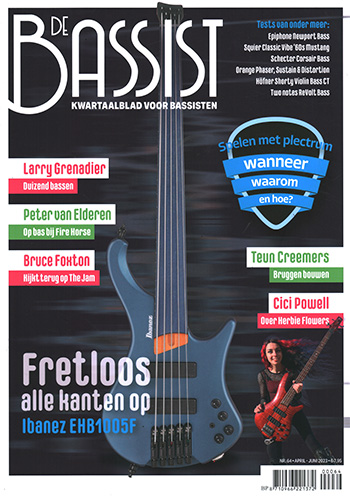In the extensive interview in DB64, April-June 2023, Teun Creemers tells all about the making of his new album Naamu, on which he works with the crème de la crème of the Malian music world, supported by fantastic drummers, percussionists and horns from the Netherlands. The result: music that sounds like Salif Keïta’s best records, with bass playing that uniquely picks up lines normally played on the Moroccan guembri or the Malian bass-n’goni. Acutely virtuosic and rhythmically complex, but oh so beautiful. Naamu is our Release of the Week.
Naamu – “I hear you!”, the cry you often hear in Mali during applause – is the title of this new album by Teun Creemers. He not only bridges the gap between music from two worlds with compositions, but also does so with his playing technique. Indeed, in Naamu’s compositions, he actually uses the bass guitar as a bass guitar. Like many African (bass) guitarists who learned to play on a kora, he often uses a kind of one-handed harp plucking technique.
Special phrasing
Teun in the interview in The Bassist: ‘I wanted to show another angle of bass guitar playing without it becoming soloistic right away, but different from just accompanying. The most typical thing about how I play on this album is that I focus on the particular phrasing that you find in basically all African music: as if you were playing repeating, varying patterns on a plucked guitar or harp, so to speak. And in fact, phrasing [articulation, accentuation and phrasing, ed.] is the most distinctive thing about how I play as a bass player anyway. I create phrases with a beginning and an end, play some notes with just a bit more emphasis, and I add slides, mutes and so on as “punctuation”.’
Malian toppers
Teun not only managed to connect a group of top Dutch musicians to his project with his compositions, such as drummer Yorán Vroom, but he also got a number of top Malian musicians enthusiastic to take on vocals on the album: Harouna Samake (kamele ngoni), Mamadou Diabate (balafon), Sefoudi Kouyaté (kora), Yacouba ‘Bloffou’ Sagara (played with Salif Keita and Vieux Farka Touré) and Kankou Kouyaté (vocals). Kouyaté? Indeed, related to world-famous ngoni player Bassekou Kouyaté.
Much more beautiful than I could have hoped for
‘We recorded the basis here in Nijmegen, the African musicians made recordings in the studio of a friend of mine in Mali, based on samples on bass or sung bits of melodies I had sent them. They made their own lyrics in their language on it, sometimes adding a syllable. For the title track, one singer himself wanted to tell a story and put it in melody. That really became the big surprise during the recording process! Although I also got all the other vocal lines and melodies back much nicer than I could have hoped.’
The above quotes are from the interview in The Bassist April-June 2023, interview by Remus Aussen.
Original language (dutch):
In het uitgebreide interview in DB64, april-juni 2023, vertelt Teun Creemers alles over de totstandkoming van zijn nieuwe album Naamu, waarop hij werkt met de crème de la crème van de Malinese muziekwereld, ondersteund door fantastische drummers, percussionisten en blazers uit Nederland. Resultaat: muziek die klinkt als de beste platen van Salif Keïta, met basspel dat op unieke wijze de lijnen pakt die normaal gesproken op de Marokkaanse guembri of de Malinese bas-n’goni worden gespeeld. Akelig virtuoos en ritmisch complex, maar oh zo mooi. Naamu is onze Release van de Week.
Naamu – “Ik hoor je!”, de kreet die je in Mali vaak tijdens het applaus hoort – is de titel van dit nieuwe album van Teun Creemers. Hij slaat niet alleen met composities een brug tussen de muziek uit twee werelden, maar doet dat ook met zijn speeltechniek. In de composities van Naamu zet hij namelijk de basgitaar ook echt als basgitaar in. Zoals veel Afrikaanse (bas)gitaristen die op een kora leerden spelen, gebruikt hij vaak een soort eenhandige harp-tokkeltechniek.
Bijzondere frasering
Teun in het interview in De Bassist: ‘Ik wilde graag ook een andere invalshoek laten zien van het basgitaarspelen zonder dat het meteen solistisch zou worden, maar wel anders dan gewoon begeleiden. Het meest typerende aan hoe ik op dit album speel, is dat ik me concentreer op de bijzondere frasering die je in eigenlijk alle Afrikaanse muziek tegenkom: alsof je repeterende, variërende patronen op een getokkelde gitaar of harp speelt, zeg maar. En in feite is frasering [articulatie, accentuering en zinsindeling, red.] sowieso al het meest kenmerkende aan hoe ik als bassist speel. Ik maak zinnen met een begin en een eind, speel sommige noten met net iets meer nadruk en ik voeg slides, mutes en dergelijke toe als “interpunctie”.’
Malinese toppers
Teun wist met zijn composities niet alleen een groep Nederlandse topmusici aan zijn project te verbinden, zoals drummer Yorán Vroom, maar hij kreeg ook een aantal Malinese toppers enthousiast om op het album de zang voor hun rekening te nemen: Harouna Samake (kamele ngoni), Mamadou Diabate (balafon), Sefoudi Kouyaté (kora), Yacouba ‘Bloffou’ Sagara (speelde bij Salif Keita en Vieux Farka Touré) en Kankou Kouyaté (zang). Kouyaté? Inderdaad, familie van de wereldberoemde ngoni-speler Bassekou Kouyaté.
Veel mooier dan ik had kunnen hopen
‘De basis hebben we hier in Nijmegen opgenomen, de Afrikaanse muzikanten hebben opnames gemaakt in de studio van een vriend van me in Mali, op basis van voorbeelden op bas of gezongen stukjes van melodieën die ik opgestuurd had. Ze hebben er zelf teksten in hun taal op gemaakt, soms een lettergreep toegevoegd. Voor de titeltrack wilde een zanger zelf graag een verhaal vertellen en in melodie zetten. Dat werd echt de grote verrassing tijdens het opnameproces! Al kreeg ik alle andere zanglijnen en melodieën ook veel mooier terug dan ik had kunnen hopen.’
Bovenstaande citaten komen uit het interview in De Bassist april-juni 2023, interview door Remus Aussen.

By Remus Aussen